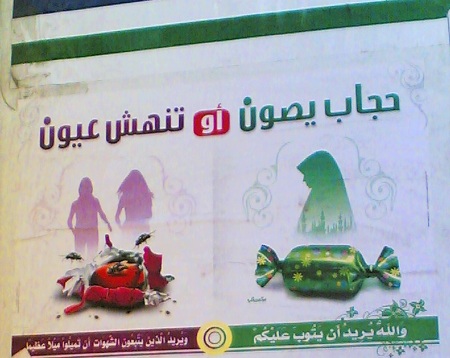681 ‘A Veil to Protect or Eyes Will Molest’
Late to this, but these adverts for the hijab, via Hatshepsut and Ursula, have put a bee in my bonnet:

“You Can’t Stop Them, but You Can Protect Yourself.”

“A Veil to Protect or Eyes Will Molest”
A few simple points:
- The hijab is a poor defense against sexual harassment.
- Whether a woman chooses to wear the hijab should be her choice alone. She should not be coerced or pressured either way.
- Men, it is our responsibility alone to make our thoughts and behavior honorable.
Along the same lines, see “Shame and Sexual Harassment” from Mona Eltahawy.
679 Draft Egyptian Media Law, Now in English
Many thanks to Arab Media and Society for translating the draft media law that ran in Al-Masry al-Youm a few weeks back.
677 Chahine
Don’t miss Baheyya’s post memorializing Youssef Chahine, Egypt’s most celebrated director, complete with scans of the original publicity pamphlets for some of his best films. I will remember him as the director of Al-Ard and Bab al-Hadid, one of my favorite films from any country.
From Bab al-Hadid:
From Al-Ard:
667 Facebook Activists Detained in Alexandria
Amnesty International has released an urgent action on the arrest of Facebook activists gathered for a mild protest in Alexandria:
PUBLIC AI Index: MDE 12/016/2008 25 July 2008
UA 208/08 Fear of Ill-treatment/Freedom of assembly and expression
EGYPT
Ahmed Afifi (m)
Mohamed Taher (m)
Ahmed Maher (m), aged 27, civil engineer
13 other protestersAhmed Afifi and Mohamed Taher were arrested while participating at a peaceful protest in the city of Alexandria on 23 July. It is not known where they are held and Amnesty International fears they are at risk of torture or other ill-treatment. Ahmed Maher and 13 other protesters are also in custody but are not believed to be at risk of torture nor other ill-treatment. Amnesty International believes all 16 to be prisoners of conscience, detained for their participation in the protest.
The protest was organized by a group calling itself “6 April Youth”, which has gathered members through the Facebook social networking website. On 23 July, a national holiday in Egypt, about 35 members of the group, mainly university students, travelled from the capital, Cairo, to Alexandria to protest. It is believed that they chose to protest in Alexandria, Egypt’s second city, in order to involve a wider number of people. Wearing “6 April” T-shirts, the group chanted slogans calling for political and economic reform in Egypt, and sang Egyptian patriotic songs. They were attacked by riot police and security forces using tear gas, who beat the protesters and forced them to lie on the ground.
More…
653 A 9/11 Carpetbagger Speaks
After September 2001, foreigners in Egypt, as a group, began to change. They used to be a motley collection of scholarly oddballs with an interest in Medieval weaponry, hieroglyphics, or Ottoman bureaucracy, scam artists with an interest in getting rich on oil or USAID contracts, or Marines with an interest in getting the hell out of here, and, if possible, getting drunk and laid in the meantime. I liked the scholarly oddballs and the Marines best.
International flotsam and jetsam of the kind you find the world over—criminals, pill-freaks, pot-heads, freeloaders, misfits, adventurers, fallen priests—would also drift in and out of town. Let’s call them “Flo” and “Sam” for short. Flo and Sam used to (and perhaps still do) congregate at the fleabitten Hotel al-Shams, which had a decent cafe where local parasites thronged to take advantage of them. I went once to find my old roommate, a shifty felucca captain with a criminal record and a good heart, after he disappeared with some of my girlfriend’s money. I watched the little symbiotic ecosystem in that cafe for hours and wasn’t once bored.
Flo and Sam would also drift into Bab al-Luq’s landmark Cafeteria al-Hurreya, where they would rub shoulders with artists, revolutionaries, real-estate agents, informers, human-rights lawyers, small-time crooks, slow suicides, journalists, and other undesirables with a shared interest in beer.
To be fair, Hurreya also catered to chess players and distinguished gentlemen such as the one who once graced the masthead of this blog. And to be fair, Flo and Sam sometimes stopped drifting, got serious and got respectable jobs: Even the former U.S. ambassador sometimes recalled his days as a shaggy-haired backpacker in Egypt, and I genuinely believe those days gave him an affinity for the country that few of his predecessors shared.
Other times, Flo and Sam got motorcycles and set off on the road to South Africa, often without any inkling that it would end somewhere in the violent and pestilential swamps of southern Sudan or, for them, at a checkpoint somewhere outside of Assiut.
Stupid, yes, naive, OK—but also adventuresome and interesting! The past few times I’ve been to Hurreya myself, I’ve been driven off by huge groups of straight-laced arriviste interns from Virginia. The kind of kids voted “most likely to run for student office, again.” Resume-padding, self-promoting bounders.
In Cairo, the boys sometimes wear beards and sandals to look more Muslimy, as if passersby will not see their blue eyes and rich-boy smirks, their mall-bought clothes, their straight, white teeth, or their glowing, pink, oxygen-fed complexions. Bent over Al-Kitab in Starbucks back in Washington or New York, sustained through dreary hours of memorizing conjugation tables by lattes and glamorous dreams of being a CIA agent or testifying to Congress, they lose the beards and the sandals in favor of outfits from Banana Republic or Urban Outfitters. They remind me of Gary Johnston on his daring trip to Cairo.
I admire their sense of purpose and their discipline, but I don’t trust this new crop of Americans learning Arabic. Many of them seem to be learning Arabic because they want jobs with the CIA or with outfits that cherry-pick the worst of Arab writing to bolster the case for Israel. I met one such Israeli-American at a student party here once. I wasted five minutes listening to him telling me how genetically rotten Egyptians were and how glad he was to be going back to Israel before I was able to extricate myself from the conversation.
It’s great that Americans, including wannabe CIA agents, are learning Arabic. It’s too bad it took a terrorist attack to inspire them. But America needs honest reporters. The Israelis already supply information on the Arab world with an Israeli agenda. No need to duplicate their efforts.
Maybe all this stored-up irritation is why this Washington Post op-ed written by Alan Dershowitz‘s research assistant, Joel Pollak, has been irritating me like sand in my swimsuit over the past few weeks.
While I don’t love Al-Kitab (I blame that book for my premature hairloss), Pollak’s assertions about it don’t hold water. Where Pollak finds totalitarian propaganda, most everyone else who has used the book finds only anodyne language exercises. Pollak tells us how he, like the ancient Israelites refusing to bow to Caesar, heroically refused to read a passage about Nasser to practice his pronunciation because it was propaganda. Here’s the passage as translated by a commenter on Matthew Yglesias’ blog:
Gamal Abdel Nasser was born in Egypt in 1918 and spent his childhood in Alexandria where his father worked in the post office. When his mother died, his father sent him to his uncle in Cairo. After his graduation from high school, he joined the Egyptian army and became an officer. He and a group of young officers called the ‘Free Officers’ ejected King Faruq from Egypt on 23 July 1952 and thus Egypt became a republic. In 1954 Abdel Nasser became the first president of Egypt, and remained president until his death in 1970. Afterwards, Anwar al-Sadat assumed the presidency of Egypt. Nasser’s most noted achievements included the nationalization of the Suez Canal, the United Arabic Republic, and the High Dam in Aswan.
Dangerous, downright un-American stuff.
In fact, Pollak’s article is thin on what he finds objectionable in Al-Kitab. His teacher showed a movie (apparently unrelated to Al-Kitab) on the life of (12th Century Andalusian Aristotle scholar) Averroes. Pollak was upset the movie didn’t mention that Jews translated Averroes’ writings into Latin. An interesting fact, and another important contribution the Jews have given to Western civilization, but hardly a fact that is essential to comprehending irregular Arabic verbs. By Pollak’s logic, Al-Kitab should also include at least a footnote in the section on reading menus that explains that Israelis also call felafel “Israeli cuisine.”
Pollak complains that Al-Kitab introduces students to Arab culture through a central character, Maha (“Maha Muhammed Abulaal, [Note the scary Muslim name!] to be precise”), whose fictional life he finds depressing. Maha is comically morose, it’s true. But so what? And if Pollak finds Maha’s life straddling New York and restaurants on the banks of the Nile depressing, he should try the life of the millions who don’t have mothers working at the United Nations and who can’t afford visas and plane tickets to New York.
He complains that the book is full of pre-September 11 biases. I’m not sure what this means. Perhaps it should be updated: Maha could dream of coming to the United States, spend months begging family members for the requisite funds to deposit in her bank account to get a visa, be denied that visa after the first attempt, succeed on a third attempt after enduring hours of rudeness and interminable waits at the U.S. Embassy, then be fingerprinted, photographed, and interrogated for hours in the “Muslim Room” at JFK. Then she could be briefly detained on a TIP for “talking Middle Eastern” on Atlantic Avenue. Are these the post-September 11 biases a language textbook should reflect?
One rather suspects that Pollak is studying Arabic so he can find the worst things written or said in that language. In starting with his textbook even before he’s finished learning, he has ejaculated prematurely. My advice to him would be, “Sit tight. As you continue to read Arabic, you will find plenty of ignorant, racist, or otherwise offensive garbage—as you will in English—and plenty of bonafide propaganda for dictatorships. Patience, young Israel-firster. Your career is assured by Dr. Dershowitz.”
Pollak’s slight of hand has been dissected elsewhere (here, here, here, and here), and his piece has been satirized here. I’ve been gratified by the response from other students of Arabic (see especially this wonderfully nerdy discussion of Al-Kitab‘s pedagogical shortcomings). It has reassured me that not all the students I see turning a venerable Cairo cafe into a dormitory mess hall are wannabe MEMRI translators.
For them, the honest ones who nonetheless are studying Arabic for careerist purposes, I have one word of advice: Mandarin.
652 The BBC on Internet Censorship
I’ve just come back from a fascinating week at the Global Voices Citizen Media Summit in Budapest. Lots to think about (I’m still mulling over questions raised in a session about cross-cultural deafness and misunderstanding around the online campaign pegged to the 2008 Olympics, for example), but in the meantime, this great report from the BBC:
(Audio courtesy of the dashing Antony Lowenstein.)
37 queries. 1.392 seconds. CMS: WordPress. Design: modified Hiperminimalist Theme.
RSS for posts and comments.
Valid XHTML and CSS.